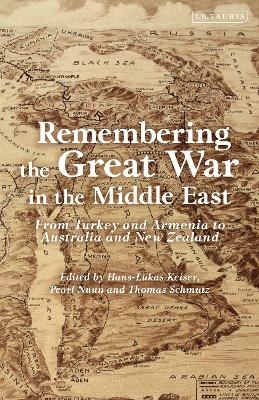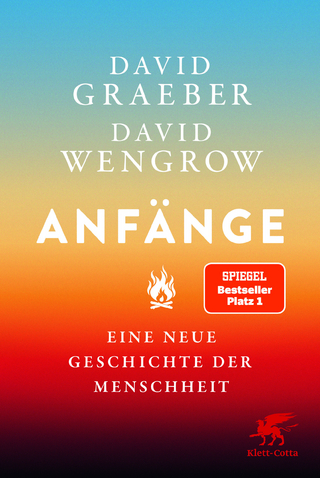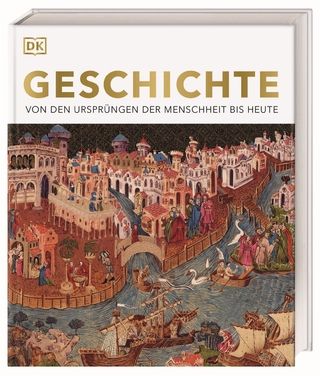
Remembering the Great War in the Middle East
Bloomsbury Publishing PLC (Verlag)
978-0-7556-3995-3 (ISBN)
In Australia and New Zealand, and even more in the post-Ottoman Middle East, the memory of the First World War still has an immediacy that it has long lost in Europe. For the post-Ottoman regions, the first of the two World Wars, which ended Ottoman rule, was the formative experience. This volume analyses this complex configuration: why these entanglements became possible; how shared or even contradictory memories have been constructed over the past hundred years, and how differing historiographies have developed. Remembering the Great War in the Middle East reaches towards a new conceptualization of the “long last Ottoman decade” (1912-22), one that places this era and its actors more firmly at the center, instead of on the periphery, of a history of a Greater Europe, a history comprising – as contemporary maps did – Europe, Russia, and the Ottoman world.
Hans-Lukas Kieser is Professor of Modern History at the University of Zurich, Switzerland. Thomas Schmutz is a scholar based at the University of Zurich, Switzerland. Pearl Nunn is a PhD candidate at the University of Newcastle, Australia. She has a Master of Arts in History from Swansea University, Wales (UK).
Introduction (Hans-Lukas Kieser, University of Newcastle, Australia; Thomas Schmutz, University of Zurich, Switzerland)
I. The Politics of Commemoration
Chapter 1: Turkish History Writing of the Great War: Imperial Legacy, Mass Violence, Dissent (Alexandre Toumarkine, Institut National des Langues et Civilisations Orientales (INALCO), France)
Chapter 2: April 25. Anzac Day Commemoration and Construction of National Identity (Rowan Light, The University of Auckland, New Zealand)
Chapter 3: April 24. Formation, Development and Current State of the Armenian Genocide Victims Remembrance Day (Harutyun Marutyan, National Academy of Sciences of Armenia, Armenia)
Chapter 4: Unremembering Gallipoli in Turkey (Erol Köroglu, Bogaziçi University, Turkey)
II. National Narratives in the former Ottoman World
Chapter 5: National Narratives Challenged. Ottoman Wartime Correspondence on Palestine (Yuval Ben Bassat, University of Haifa, Israel; and Dotan Halevy)
Chapter 6: Official and Individual Lenses of the Remembrance of the First World War: Turkish Official Military Histories and Personal War Narratives (Mesut Uyar, UNSW Canberra, Australia)
III. Australians’ Embrace of Gallipoli
Chapter 7: Turkey, Australia, and the Noble enemy-turned-friend (Kate Ariotti, University of Newcastle, Australia)
Chapter 8: A Foundational Myth: Gallipoli and the Architecture of Memory in Canberra (Daniel Marc Segesser, Bern University, Switzerland)
Chapter 9: Gallipoli in Diasporic Memories of Sikhs and Turks (Burcu Cevik-Compiegne, Australian National University, Australia)
IV. Contested Memories: New Zealand, Turkey and Armenians
Chapter 10: “To have and to hold”: Chunuk Bair and New Zealand`s Gallipoli Imagining (Bruce Scates, Australian National University, Australia)
Chapter 11: New Zealand and the Armenian Genocide (Maria Armoudian, University of Auckland, New Zealand; James Robins, V.K.G. Woodman)
Chapter 12: Can the Survivor Speak? (Talin Suciyan, LMU, Germany)
Afterword (Peter Stanley, UNSW Canberra, Australia)
Index
| Erscheinungsdatum | 03.04.2023 |
|---|---|
| Zusatzinfo | 14 bw illus |
| Verlagsort | London |
| Sprache | englisch |
| Maße | 156 x 234 mm |
| Themenwelt | Sachbuch/Ratgeber ► Geschichte / Politik ► Allgemeines / Lexika |
| Geisteswissenschaften ► Geschichte ► Regional- / Ländergeschichte | |
| Sozialwissenschaften ► Politik / Verwaltung ► Politische Theorie | |
| ISBN-10 | 0-7556-3995-2 / 0755639952 |
| ISBN-13 | 978-0-7556-3995-3 / 9780755639953 |
| Zustand | Neuware |
| Haben Sie eine Frage zum Produkt? |
aus dem Bereich


